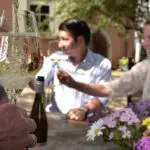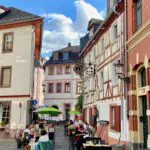Here’s a wine category one might not relate to German wine: sparkling wine or ‘Sekt’ in German. You haven’t heard of Sekt? That’s easily forgiven since Germany hardly exports its Sekt. For some reason export markets for sparkling wines have been left to Champagne, Cava, and Prosecco. Possibly it’s that we, in Germany, we drink so much of our own stuff that no winemaker would bother exporting it.

But, if you are planning a wine tour in Germany, add Sekt right next to German Riesling and Pinot Noir on your list of must-be-tried.
Yes, we love our bubbles in Germany (and that of our neighbours, too). Germans are world champions in consuming sparkling wines: 400 million bottles or about 300 million liters which equals one quarter of the world’s total production of sparkling wines are gobbled up every year in Germany. We have sparkling wine for weekend brunch, as a remedy for low blood pressure, to celebrate, to grieve, and, of course, we also drink it just because. A wine fridge without a sparkling wine is considered half-empty.
Why a love affair with this particular wine type? There is no definite answer, but what answer there is, is soundly rooted in history. Did you ever wonder why so many of the famous Champagne houses have German names? Krug, Taittinger, Pieper-Heidsieck, Mumm, Bollinger…. Those are all German names. Those French Champagne houses were founded or managed by Germans 200-300 years ago. Even a soundly French house like Veuve Cliquot had German hands: riddling and degorging was invented with help of German cellar masters Antoine Müller und mit Alfred Werlé , and it was German export management that who fired up sales and helped the young widow Cliquot build the global brand Veuve Cliquot. And it was in Mainz, Germany, that sparkling wine production got scaled to mass output when the Methode Charmat (tank method) was invented to rival the Methode Champenoise (méthode traditionelle). At the turn of the 19th century, drinking sparkling wine was so popular that the German Government did not meet much resistance when introducing a ‘Sektsteuer’: a tax specifically on sparkling wines. Interestingly it is still in place today. (We would love to know what those 400 million Euros are used for.)
It’s probably the focus on quantity and efficiency why much of Germany’s sparkling wine production lacked quality for a long time. For some winemakers, the process of making sparkling wine, especially adding the ‘dosage’ in the form of a sweet liquid, offered a welcome chance to mask low-quality wines. The last turn of the century witnessed not only a renaissance in German wine making, but specifically in German sparkling wines. Sekt is one of the few wine categories that is growing strongly – especially the subcategory Winzersekt. Winzersekt follows the Méthode Traditionelle (a different name for the Champagne method) in which a high-quality base wine is subjected to a second in-bottle fermentation. Many Winzersekts stand up to Champagne— bubbles up and hands down—but at half the price. German Winzersekt is one of the most underrated wine categories abroad. Give them a try!
So, if the great sparkling wines of Germany aren’t available near you, enjoy them where they are made. On your next wine tour in Germany, see if you can stop at some of these wineries and taste their bubblies:
In the wine region of Pfalz:
– Wein- und Sektgut Wilhelmshof: try Pinot B Sekt Brut
– Frank John ‘Hirschhorner Weinkontor’: try Riesling Sekt Brut -41-
In the wine region of Rheingau:
– Sektmanufaktur Schloss Vaux: Rosé Sekt Brut
– Sekthaus Solter: Rheingau Riesling Sekt Brut
– Barth Wein- & Sektgut: Riesling Sekt Brut
– Sekthaus Bardong: Erbacher Honigberg Brut
In Mosel:
– Sektgut St Laurentius: Riesling Crémant Brut
In the wine region of Rheinhessen:
– Sekthaus Raumland: any of their Sekts ( ☺ it’s the only thing they make)
– Weingut Braunewell: Chardonnay Sekt Brut Cuvee Francois
In Hessische Bergstrasse:
– Griesel & Companie: Griesel Riesling Sekt Prestige Extra Brut
Enjoy!








